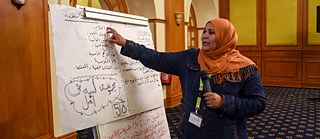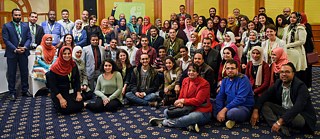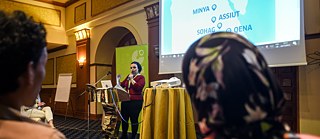Networking in Upper Egypt Picks Up Speed

In urban centres like Cairo, events and projects on gender and women’s empowerment have come a long way: Here, they are almost guaranteed successes, attracting large audiences, great interest, and enthusiasm. This is not the case in Egypt’s rural areas, especially in Upper Egypt, where social change is slow and outspoken challenges to traditional gender concepts limited to few tentative steps. Therefore, the Goethe-Institut Cairo supported key actors in Upper Egypt in 2017 with workshops and a conference that responded to their capacity-building and networking needs, and advanced the training of multipliers for knowledge on gender.
Since 2015, the Goethe-Institut Cairo has been focusing more strongly on gender issues and women’s empowerment in its projects under the “Dialogue and Transition” Programme, funded by the Federal Foreign Office in Berlin. And not without success: The public response to workshops, film screenings, or discussion rounds on gender was unmistakingly positive. “Beside the launch of Wiki-Gender in autumn 2016, which is an online encyclopaedia on gender in Arabic, and training programmes with local partners in Cairo, we have recently been notably active in Upper Egypt with capacity-building projects,” says Johanna Keller, Head of the Cultural Programmes Department of the Goethe-Institut Cairo. She explains that gender training courses in spring had been followed up with a three-month training-of-trainers programme in touristy Luxor later that year, and came to a preliminary conclusion with a networking conference on 3 December 2017. “Projects in this field have been growing in scope since 2015. We are delighted to reap the fruits of that work today,” Keller said on the margins of the conference.

The Goethe-Institut used the conference also to introduce new projects like Wiki-Gender to a larger audience, and to help its training-of-trainers alumni to forge working contacts for the future, says Eckart. In the first place, however, the conference aimed at giving the work of the support centre, at whose premises in Luxor multipliers had been trained, a more solid foundation. Another purpose of the conference was to strengthen networking efforts between individuals and initiatives working on gender issues and to facilitate knowledge transfer, explaines Johanna Keller. The conference as well as the support centre meant to provide an impulse on the ground that would encourage gender actors to pass on their knowledge and train multipliers. Keller is convinced that this was particularly important for Upper Egypt, as knowledge transfer is always more difficult outside of big cities.
Long-Term Change in Rural Egypt
The work of the support centre in Luxor was at the heart of the Goethe-Institut’s most recent projects in Upper Egypt. Since October 2017, it has been conducting gender training courses and training-of-trainers. “We began with workshops on the basics, in which we could discuss different concepts, but also local conditions and differences between city and village, with people from the region,” says Hoda Kandil, coordinator of the support centre in Luxor and experienced civic education trainer. She explains that a flexibility in training contents was important to respond to local requirements, as in Upper Egypt, concerns about female genital mutilation and women’s education prospects were more severe and marriage problems simply different compared to Egypt’s urban North.
What these people, and above all the female participants, had needed more than anything was a space in which they could discuss certain issues openly, while for the trainer alumni it had been important to try out their training skills, Kandil believes. The participation of men in the workshops and discussions, she continues, had been very much appreciated given that a transformation of gender roles was only possible if women and men fought for it together.

Positive Project Prospects for the Future
Seeing the great response the training-of-trainers programme in Luxor has received, the Goethe-Institut Cairo has every reason to be optimistic at the end of this year’s project cycle. “In 2018, we wanted a better structure for our projects in Upper Egypt, and train a core target group of multipliers for gender knowledge to work with in the future,” says Michaela Eckart. “We hope that we will be able to resort more and more to Egyptian trainers from the region to assist in our gender and civic education projects in Upper Egypt.” After all, change will have to come from within.Back to Dialogue & Transition